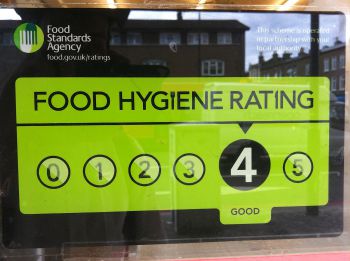Government urged to halt food-safety overhaul
By: James Hakner
Last updated: Friday, 9 March 2018

Image copyright: Quinn Comendant via https://www.flickr.com/photos/qcom/9702590081
Leading food-safety experts have urged the UK Government to halt plans to outsource food safety inspections to private companies.
The proposals would, according to a new report published today by the Food Research Collaboration, endanger public health and damage UK food exporters after Brexit.
The report by Professors Erik Millstone at the University of Sussex and Tim Lang at City, University of London questions why the Food Standards Agency (FSA) is pushing forward with a programme of change (called Regulating Our Future - or ROF) that will destabilise the institutions responsible for enforcing food safety standards.
The timing could not be worse, according to the researchers, with the Government still to clarify exactly how it plans to manage the effects of Brexit on the UK food industry. An unprecedented 37 food industry bodies signed a wake-up call on ‘Food Brexit’ on February 15.[1] These did not include any consumer or public health bodies. That perspective is also needed, say Millstone and Lang, as is shown by significance of the ROF proposals.
Professor Millstone said: “ROF is terrible timing when Government has not even clarified how UK food security will be adversely affected by Brexit.
“These changes would impose a flawed shift in responsibility for food law enforcement.
“This would be risky at the best of times but, when uncertainties abound over ‘Food Brexit’, this is bad policy being rushed through when Ministers and Parliament are not paying attention.
“You cannot ‘put consumers first’ by keeping them in the dark. Food companies are well aware of the risks, but the government has not listened.”
The report shows that ROF will:
- make the UK’s food supply less safe by further weakening systems that are already too weak.
- create irreconcilable conflicts of interests - instead of public officials inspecting food businesses, the companies will chose who will ‘mark their homework’.
- hand over responsibility for food safety inspections and audits to private commercial third-party providers, when outsourcing to private companies has already been shown to be more expensive, less reliable, and in the case of Carillion unsustainable.
- undermine the 1999 Food Safety Act, which assumed that safety and quality standards would be enforced by adequately trained and resourced local authority Environmental Health Officers (EHOs) and Trading Standards Officers (TSOs) in collaboration with Public Analysts - ROF undermines that expectation.
The report shows that the FSA is already a dangerously weakened body. Its budget has been cut by 23% from 2011-12 to 2016-17. The number of samples taken for testing by EHOs in the UK fell by 22%, and in England by almost 25%. At that rate of reduction, testing will have ceased in less than four years.
The report’s authors found only one aspect of the ROF proposals that could benefit consumers: the proposal to enforce the mandatory registration of all Food Business Operations (FBOs). Local authority EHOs want to be able to refuse to register FBOs that cannot demonstrate they can produce food that is safe and honestly labelled.
“They are right”, said Professor Lang. “Currently the FSA knows far too little about what food businesses are doing, but consumers know even less; to push this out of the hands of local authorities is poor governance and could be dangerous for public health. “As food trade deals with far-off countries are proposed by the Government, who will protect the consumer?”
Why this matters for Food Brexit
Implementing the proposals in RoF 2017 is highly likely to harm the ability of British producers to sell their food products in the EU market after Brexit. The EU will almost certainly refuse to accept imports of UK food products, unless safety standards are enforced by public sector institutions and personnel.
A major issue is access to industrial food-safety data. The FSA hopes that FBOs and third-party assurance sub-contractors will readily share any data the FSAs request, but in exchange the FSA has promised to keep all those data, and presumably all analyses of those data, entirely confidential.
Recommendations
The authors recommend that:
- ROF should be put on hold. Almost every aspect of ROF should be discarded, especially while the uncertainties of Brexit for food trade and regulation remain unresolved.
- A special Parliamentary joint select committee, between the Health and Environment, Food & Rural Affairs committees, should be urgently convened to review the ROF proposals.
- In any event, the 1999 Food Safety Act should be immediately amended to give the FSA (and counterparts in Scotland, Northern Ireland and Wales) the power to oblige FBOs to collect minimum food safety and quality monitoring data on their ingredients, processes and products, and the power to require all FBOs to share those data with their local authorities and with the FSA.
- Food safety data already being collected should be used to create and publish food safety performance league tables, categorising all types of FBOs along the lines of the Food Hygiene Rating System, rather than restricting that scheme just to restaurants and cafes.
Further information: http://foodresearch.org.uk/publications/weakening-uk-food-law-enforcement/